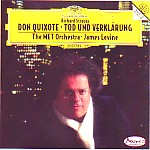James Levine raised the MET orchestra to an exceptionally high standard in his decades as its Music Director, so as with Vienna it only makes sense that it should dip its collective toes into the concert repertoire from time to time. Unfortunately, this project only got going as the major labels were self-destructing, so the available repertoire is limited and the results somewhat hit or miss. These are good performances, but not really great ones. Don Quixote is somewhat charmless, though solo cellist Jerry Grossman plays extremely well and yields little to the more illustrious competition.
Still, the scene with the sheep sounds nasty rather than “sheepish”, while the ride through the air fails to take off quite as it should. Mind you, nothing goes wrong and it’s never bad; it just tends to bog down here and there. It may be that the multi-miked recording, vivid but somewhat claustrophobic, contributes to a certain “in your face” lack of geniality, a quality that Strauss otherwise captures so well in his music for both the cellist Don and his viola/tuba-playing sidekick Sancho.
Levine’s powerful, richly sonorous account of Death and Transfiguration has some splendid moments: the first orchestral eruption, for example, and the concluding apotheosis. The solo winds are also splendid (oboe and flute especially). But once again the basic tempo is rather slow, although Karajan, in his final recording for this same label, used very similar speeds and managed an even greater level of sheer intensity. There are approximately 70 recordings of this tone poem currently available in some form or another, many of sterling quality (let’s not forget Kempe on EMI and Szell on Sony, to name only two classic versions). While there’s plenty to admire here in terms of sheer mastery of execution, it’s impossible to list this disc as a top recommendation. As a showcase for Levine’s superb orchestra, I enjoyed this “on-demand” reissue from Arkivmusic.com, but it’s hardly a necessary addition to your Strauss collection.
































